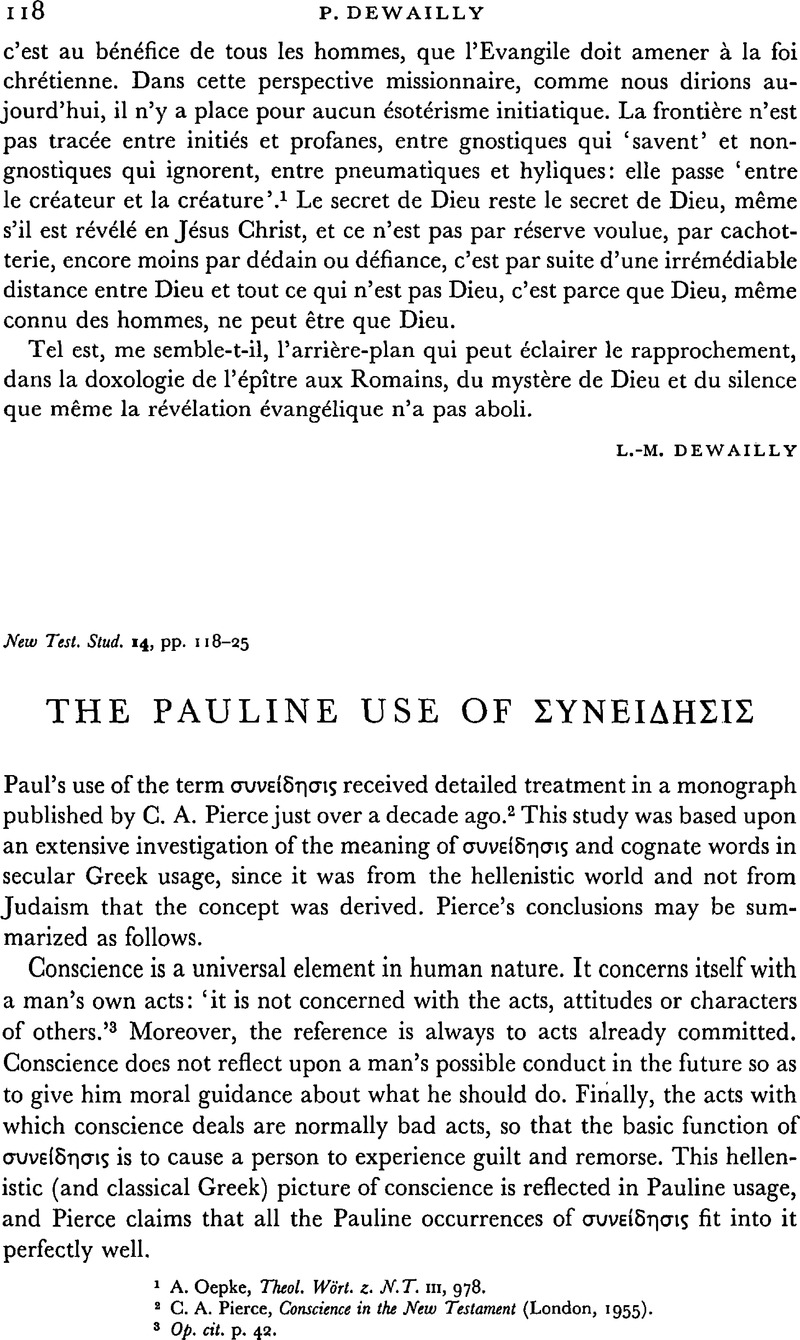Article contents
The Pauline Use of Συνείδησıς
Published online by Cambridge University Press: 05 February 2009
Abstract

- Type
- Short Studies
- Information
- Copyright
- Copyright © Cambridge University Press 1967
References
page 118 note 1 Oepke, A., Theol. Wört. z.N.T. in, 978.Google Scholar
page 118 note 2 Pierce, C. A., Conscience in the New Testament (London, 1955).Google Scholar
page 118 note 3 Op. cit. p.42.
page 119 note 1 See his article on συνεíδησıς in Theologisches Wörterbuch zum Neuen Testament, VII, 912 ff.
page 119 note 2 Stacey, W. David, The Pauline View of Man (London, 1956), pp. 206ff.Google Scholar
page 119 note 3 Op.cit. p. 207.
page 119 note 4 It is necessary here to comment briefly on the article by Kallas, J., ‘Romans xiii. 1–7: An Interpolation’, in New Testament Studies, vol. xi, no.4(July 1965). As the title suggests, the article maintains that these verses are not to be attributed to Paul, but are a later insertion into the text. The main arguments, however, are unconvincing. Kallas thinks that the section is independent of its context and interrupts the flow of thought. But the theme of όρλή relates to what has gone before (xii. 19), and the notion of indebtedness carries on from xiii. 7 to xiii. 8. Moreover, I hope to show that there is a genuine theological connexion between awe 15nals in this section and vduos in the following verses. It is true that what is said here may seem incompatible with the Pauline hope of an imminent Parousia, but this expectation has already diminished with the writing of II Corinthians. The meaning of ⋯ξουσíα is said to be contrary to Paul's normal usage. But if the word is in general capable of bearing several different senses, there is no need to impose an absolute uniformity upon its occurrences in Paul. The strongest argument against Pauline authorship is that Paul believed the present world order to be evil and under the control of the demonic powers. It is therefore unlikely that he would see the dominant institution of the present world as an instrument of the divine providence. Kailas goes so far as to say that this passage assumes that the world is no longer estranged from God. The latter statement, however, is plainly untrue, since the world is here still subject to óρλή. Furthermore, it is possible that Paul saw the civil authorities as constituting a bulwark against the demonic powers (see C. K. Barrett, The Epistle to the Romans, pp. 248–9). The view of the state expressed in Rom. xiii. 1–7 is not, therefore, necessarily incompatible with the belief that the world is to some extent in the grip of these hostile spiritual forces. Lastly, the present world order is not totally evil: Paul admits that Gentiles may fulfil the moral law (Rom. ii. 14–16). In that case, it would not be impossible for him to regard the political authorities as exercising a beneficial function, especially as such a view was one of the beliefs which he may have inherited from Judaism.Google Scholar
page 120 note 1 See Sanday and Headlam, A Critical and Exegetical Commentary on the Epistle to the Romans, in loc.; also M. J. Lagrange, Saint Paul: Epitre aux Romains, in loc.
page 120 note 2 Op.cit. pp. 66ff.Google Scholar
page 120 note 3 Ibid. p.71.
page 121 note 1 See Barrett, C. K., The Epistle to the Romans, p. 33.Google Scholar
page 121 note 2 Op.Cit. p. 72.
page 121 note 3 Dodd, C. H., The Epistle of Paul to the Romans, in loc.Google Scholar
page 122 note 1 See James, Moffatt, The First Epistle of Paul to the Corinthians, p.114.Google Scholar Paul's plea, he says, is ‘that one must respect another’s moral judgement upon his own life, even when one cannot follow it as a rule for one's own'. Cf. Jean Héring, La Première Epiitre de Saint Paul aux Corinthiens, in loc.
page 122 note 2 Op.cit. p. 78.
page 123 note 1 Op. cit. pp.87–8
page 124 note 1 See the references given by Pierce, , op. cit. pp. 46, 48–9.Google Scholar
page 124 note 2 Op. cit. p. 53.
page 125 note 1 Op. cit. p. 44.
page 125 note 2 Art. cit. p. 915.
- 4
- Cited by


